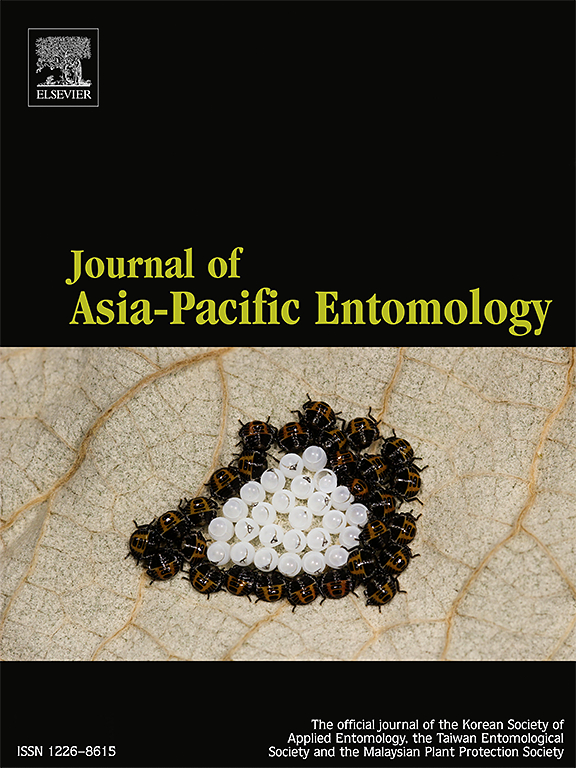Community shift of aquatic insects following waste-water treatment implementation at Dongda Creek, Taichung City, Taiwan
IF 1.3
3区 农林科学
Q3 ENTOMOLOGY
引用次数: 0
Abstract
Urbanization and industrialization have severely degraded Taiwan’s freshwater ecosystems, including Dongda Creek in Taichung City, which received 10,000 tons of wastewater daily. To address this, a wastewater treatment plant (WWTP) was constructed by Tunghai University and the Taichung City Government, and its ecological impact was assessed through water quality and aquatic insect diversity monitoring before (2019–2020) and after implementation (2021–2023). Water quality measurements included temperature, pH, nutrients, and dissolved oxygen, while aquatic insect communities were analyzed using diversity indices and multivariate techniques. Results revealed significant water quality improvements, including reduced fat content and total nitrogen levels, although nitrate concentrations increased. The dominance of pollution-tolerant Chironomidae declined post-WWTP, while sensitive taxa such as Baetidae, Hydrophilidae, and Libellulidae emerged, accompanied by significant increases in diversity indices (taxa richness, Shannon, and Simpson). Seasonal patterns in insect diversity became more pronounced after the WWTP became operational. Environmental variables such as pH, temperature, and biochemical oxygen demand significantly influenced insect distributions, with Chironomidae thriving under poor conditions and sensitive taxa increasing as water quality improved. This study demonstrates that WWTP implementation can enhance water quality and foster ecological recovery, as evidenced by the recolonization of sensitive aquatic insect taxa and increased diversity. These findings highlight the effectiveness of restoration projects like WWTPs in improving ecosystem health and underscore the importance of ecological monitoring in freshwater management and conservation. Dongda Creek serves as a valuable case study for guiding urban river restroration efforts in similar contexts.

台中市东大溪污水处理后水生昆虫群落变化
城市化和工业化已经严重破坏了台湾的淡水生态系统,包括台中市的东大溪,每天接收1万吨废水。为解决这一问题,东海大学与台中市政府合作建设污水处理厂,并通过实施前(2019-2020年)和实施后(2021-2023年)的水质和水生昆虫多样性监测来评估其生态影响。水质测量包括温度、pH、养分和溶解氧,水生昆虫群落采用多样性指数和多变量技术进行分析。结果显示,水质显著改善,包括脂肪含量和总氮水平降低,尽管硝酸盐浓度增加。污水处理后,耐污染Chironomidae的优势地位下降,而Baetidae、Hydrophilidae和Libellulidae等敏感分类群出现,多样性指数(分类群丰富度、Shannon和Simpson)显著增加。在污水处理厂投入使用后,昆虫多样性的季节性模式变得更加明显。pH、温度和生化需氧量等环境变量对昆虫分布有显著影响,在恶劣条件下手摇蝇科数量增多,随着水质的改善,敏感类群数量增加。该研究表明,实施污水排放计划可以改善水质,促进生态恢复,如敏感水生昆虫类群的重新定殖和多样性的增加。这些发现强调了像污水处理厂这样的恢复项目在改善生态系统健康方面的有效性,并强调了生态监测在淡水管理和保护中的重要性。东大溪为指导类似背景下的城市河流修复工作提供了有价值的案例研究。
本文章由计算机程序翻译,如有差异,请以英文原文为准。
求助全文
约1分钟内获得全文
求助全文
来源期刊

Journal of Asia-pacific Entomology
Agricultural and Biological Sciences-Insect Science
CiteScore
2.70
自引率
6.70%
发文量
152
审稿时长
69 days
期刊介绍:
The journal publishes original research papers, review articles and short communications in the basic and applied area concerning insects, mites or other arthropods and nematodes of economic importance in agriculture, forestry, industry, human and animal health, and natural resource and environment management, and is the official journal of the Korean Society of Applied Entomology and the Taiwan Entomological Society.
 求助内容:
求助内容: 应助结果提醒方式:
应助结果提醒方式:


